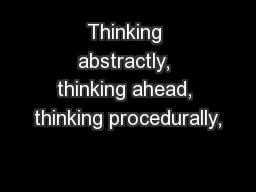PPT-Chapter 7: Cognition: Thinking, intelligence and language
Author : alexa-scheidler | Published Date : 2018-12-06
What does it mean to think How does thinking work Do now 1 What does the term cognition mean to you What does it mean What is involved with it 2 What types of
Presentation Embed Code
Download Presentation
Download Presentation The PPT/PDF document "Chapter 7: Cognition: Thinking, intellig..." is the property of its rightful owner. Permission is granted to download and print the materials on this website for personal, non-commercial use only, and to display it on your personal computer provided you do not modify the materials and that you retain all copyright notices contained in the materials. By downloading content from our website, you accept the terms of this agreement.
Chapter 7: Cognition: Thinking, intelligence and language: Transcript
Download Rules Of Document
"Chapter 7: Cognition: Thinking, intelligence and language"The content belongs to its owner. You may download and print it for personal use, without modification, and keep all copyright notices. By downloading, you agree to these terms.
Related Documents














